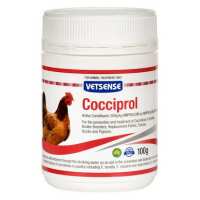
Coccidiosis in chickens is a common ailment. Coccidia are parasites which infect the chicken's stomach tissue upon ingestion. They are found in the soil and passed on through the faeces of infected birds. Once attached to the intestinal tissue, the coccidia start to multiply and spread. In severe cases, this will cause bleeding within the intestinal tract or cecal, which starts to have a negative impact on the animal's health.
Coccidia are found in almost all chicken coops but coccidiosis, which is illness caused by coccidia infestation, mostly occurs in chickens that are stressed, already unwell or young. Introducing a new strain of coccidia to the chicken coop can also cause coccidiosis in otherwise healthy, adult birds.
If left untreated, coccidiosis in chickens can be fatal. Smart backyard chicken keepers keep Amprolium on hand as a treatment for coccidiosis and a preventative measure against this fatal illness.
Cocciprol Amprolium contents:
Amprolium 100g as Amprolium Hydrochloride at a concentration of 200g/kg
Resealable container
Measuring spoon
Instructions on packaging
What causes coccidiosis?
Chickens that develop coccidiosis are most often infected via the faeces of other infected chickens or even wild birds. This is why an infection can spread so quickly, especially since the parasite shows up in the faeces before other symptoms start to manifest.
The severity of the infection can vary depending on the amount of coccidia originally ingested and the overall health of the bird. Young birds are often more susceptible to coccidiosis because adult birds have developed an immunity to the coccidia they are most often exposed to. The parasite is more likely to thrive in the warmer months, and it is commonly found in broilers and layers. Birds that are stressed or unwell are most likely to suffer from coccidiosis.
Symptoms of coccidiosis in chickens:
Symptoms of coccidiosis can be detected early. Infected birds will often look dirty and act weak. It can also cause the hens to puff up and have little movement. Chickens may also be pale and have a poor appetite. Advanced infections will manifest with bloody stools or other faecal discolouration. Recognise and prevent coccidiosis in chickens
The number one treatment for coccidiosis
The most effective way to treat coccidiosis in chickens is with an Amprolium Coccidiostat such as Cocciprol. Use Amprolium at the first sign of the infection. Simply add the powder to the drinking water as per the directions. Use continuously for up to a week, depending on the severity of the infection. The dosage should then be progressively reduced over the next two weeks in order to build immunity. Use coccidiostat to effectively treat infected birds. Also safely use as a preventative measure for healthy birds.
To control coccidiosis in chickens, keep the living conditions clean and change the water supply frequently. Good sanitation and nutrition are significant indicators in the prognosis of any coccidia infection. Treatment with a Coccidiostat is important at the first sign of infection.
Cocciprol is recommended for use in chickens (broilers, broiler breeders, replacement pullets), turkeys, ducks and pigeons for the treatment of coccidiosis.
Dosage For Chickens
The dose rate for Cocciprol Amprolium for chickens is 5 grams to 4 litres of water.
Always follow product instructions and comply with relevant withholding periods.
Phone:
0432143005
Email:
murray@finlaysondigital.com
Location:
16 Camuglia street,
Garbutt
Queensland
4814

